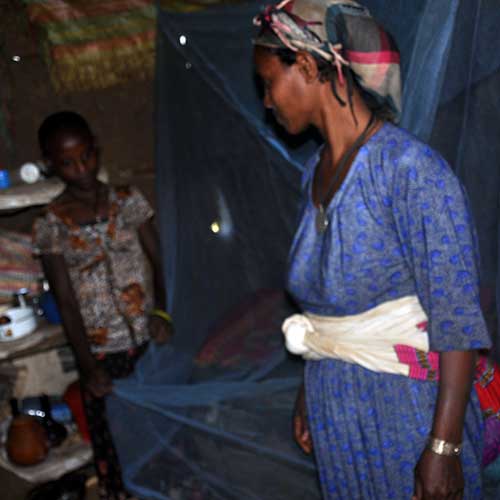Singing Key Malaria Prevention Steps: A Tool Enhancing Malaria Awareness
Malaria is a serious health problem in Dera woreda in the Amhara Region of Ethiopia. Just two years ago, the reported number of malaria cases confirmed by laboratory diagnosis was 1,429 children under the age of five and 41 pregnant women. At that time, community members were not aware that pregnant women and children younger than five years old are at high risk of malaria, and in households where there are not enough mosquito bed nets to protect everyone, these women and children should be given priority to use them.
A PMI-funded social and behavioral change communication project targeting 25 kebeles used students and religious leaders as agents of change to help mitigate the problem of malaria in Dera woreda.
At Wonchet kebele, peer education and other in-school strategic behavioral change communications strategies have been used to disseminate key malaria action messages.
In Mutansa primary school, peer educators and peer participants in the anti-malaria club designed their own strategy to increase malaria awareness. The student participants composed songs with key malaria action messages. These songs have been performed at the school and nearby community events, including a recent flag ceremony. The students, along with the health extension workers and school teachers, also provide key malaria action messages to the community during house-to-house educational visits. If a household is identified as lacking a bed net during one of these educational sessions, the students alert a health extension worker, who then helps the household to secure a net.
As a result, the number of malaria cases in children under five and pregnant women significantly decreased from the previous year. After one year, the health office report showed that only 341 children under five and six pregnant women were diagnosed with malaria, a 76 percent and 85 percent decrease, respectively.
Now, all the students in the primary school and community members in the kebele are using health services to prevent and control malaria properly. “No single student in the school or household is sleeping without bed nets,” said Addis Eskeziaw, a Wonchet community member. She added, “Before the project, the community was misusing bed nets, and priority for pregnant women and children under five was not given. But now, thanks to our students, we are using bed nets regularly, going to the health facility with 24 hours of fever, taking medicine properly, conducting environmental management activities, and giving priority to pregnant women or under-five children to sleep under bed nets.” She also said, “I haven’t heard of anyone suffering from malaria in the kebele recently.”

